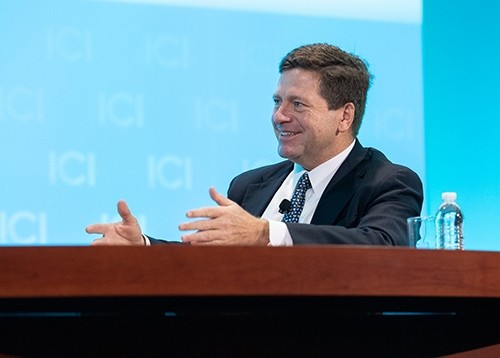ICI Viewpoints
SEC Chairman Jay Clayton Tackles Hot Topics at GMM

In introducing SEC Chairman Jay Clayton ahead of his highly anticipated appearance at ICI’s 61st annual General Membership Meeting this morning, ICI President and CEO Paul Schott Stevens praised the chairman’s “erudition, dedication, and acumen” in leading the Commission. And during their 40-minute conversation—which tackled some of the top issues facing funds and their investors—each of those qualities was on show.

Standards of Conduct
The debate over how best to craft standards of conduct for investment professionals has never been short of controversy. In his opening volley, Stevens asked Clayton what motivated him to jump into the debate so early in his tenure—especially with no one knowing how the Department of Labor’s fiduciary rule would work in practice.
Confusion and uncertainty in the marketplace made it a necessity, Clayton responded. “If we didn’t step up and bring clarity in this space, that uncertainty was going to continue, which was going to create drag for investors over the long term,” he said. “And that’s just inconsistent with what our mission is.”
Clayton cautioned that there will never be a “silver bullet” here, but he emphasized that a regulatory framework prescribing only one form of advisory relationship would not be optimal for investors. “Competition among the people in this audience has in many ways been to the benefit of investors over time,” he said. “Fees have come down; services have gone up. The investor engagement you see today is far superior to the investor engagement of a decade ago.”
Competition in Asset Management
Around the SEC’s headquarters, competition is on more minds than Clayton’s. Division of Investment Management Director Dalia Blass recently voiced her concerns for investors if small- and mid-sized asset managers were to get “lost in a wave of consolidation and fee compression,” and is launching an outreach initiative to hear from those firms. Noting those developments, Stevens asked the chairman for his view of the industry’s competitive landscape.
Clayton agreed that “when we as regulators act, we do have to be cognizant of whether we’re creating barriers that make it so only the big win.” But he was “not prepared to make a definitive statement about whether the barriers to entry have become too high or as such that you’re favoring a very large player over the smaller ones.” The chairman did say that he’s thinking hard about the issue: “I will tell you it’s on my mind.”
ESG Investing
Interest in environmental, social, and governance—or ESG—investing continues to grow, especially in Europe. But what’s the SEC’s role here?
Clayton asserted that policymakers would do well to rethink how they approach discussions about the topic. For the SEC, “lumping E, S, and G together is not the way to have an effective conversation,” he explained. Good governance and transparency are an obvious part of the Commission’s mandate. But when considering the environmental and social elements, he added, that’s where the approach needs to be “more idiosyncratic.”
Keeping Above the Political Fray
In wrapping up the session, Stevens zoomed out to a broader view of the SEC, lamenting that the Commission’s work has grown more politicized over the years.
That hasn’t fazed Clayton—or, in his view, the 4,600 SEC employees who come to work every day focused on investors’ long-term interests. “As tides change—as winds change—the fact that they’ve stayed focused on the long-term interests of Main Street investors has served the Commission very well.”
Garrett Hawkins was director of media relations at ICI.
